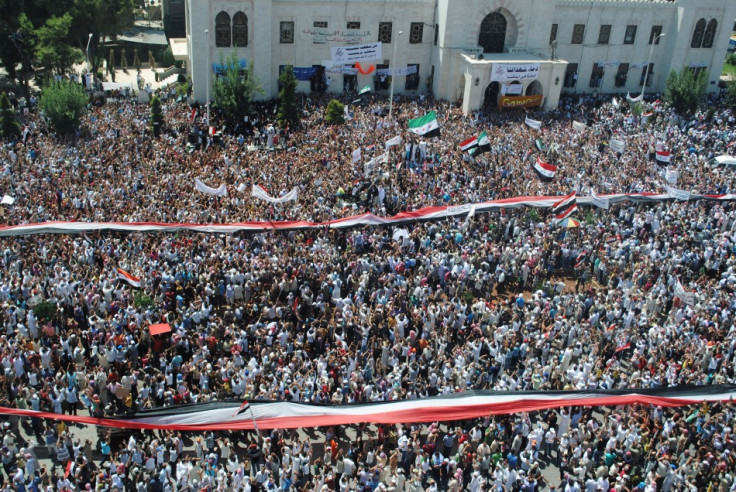Is Syria Sliding into Civil War?
The regime's crackdown continues, with no end in sight.

Syrian forces killed nearly 142 people when the army stormed the city of Hama, which is seen as the hub of the anti-Assad movement, to crush government dissent on the eve of Ramadan, according to political activists.
According to Al Jazeera, the Syrian government forces continued the crackdown on Monday morning, launching fresh attacks on the town in another attempt to eradicate anti-government protest.
Sunday's attack on Hama led to international outcry and was said to be one of the "deadliest days" since the protests erupted, Rami Abdel Rahman, the head of the Britain-based Syrian Observatory for Human Rights, said.
Human rights groups have warned that of the 142 people killed across Syria, 100 victims were from Hama alone. Hospitals in the city have said they are now unable to cope with the surge of victims, as they lack both resources and personnel.
Anti-Assad protests have taken place throughout Syria for months and despite recurrent attacks by government forces, the pro-democracy movement, which calls for the leader's demise, refuses to calm down.
On Friday, more than 500,000 people reportedly rallied in Hama following Muslim prayers, during which a cleric told the congregation "the regime must go."
The security forces however, brutally reprimanded protesters, and allegations of soldiers throwing nail bombs at civilians in a suburb of the capital Damascus surfaced, prompting an international outcry over the atrocities committed by the Assad regime.
The government, on the other hand, still denies any wrong doing, and stubbornly insist the protesters are "armed gangs" and fundamentalist Salafist Muslims who are trying to destabilise the country and cause a state of lawlessness.
Western powers condemned the violence, with Germany and France warning they would seek new sanctions against the Syrian government, which was promptly followed by Germany's UN Mission confirming it had asked for a Security Council meeting on Syria, with consultations expected to take place on Monday afternoon.
Measures targeting Assad, at least two dozen officials and Syrian firms linked to the military, are already in place.
It is not clear, however, what measures will be taken on Monday, as the Security Council is still divided over how to respond to the Syrian crisis.
While Britain, France, Germany, Portugal and the United States have been pressing for weeks for stricter sanctions, Russia, China, South Africa, India and Brazil - which do not support the Nato bombing campaign in Libya - have refused to support the move, fearing a similar operation in Syria.
Moscow and Beijing have also warned they would veto any formal resolution against Assad.
Meanwhile, U.N. Secretary-General Ban Ki-moon called for an end to the violence, and said Syrian authorities "are accountable under international human rights law for all acts of violence perpetrated by them against the civilian population."
Also, U.S. President Barack Obama said in a statement he was "appalled by the use of violence and brutality" against the Syrian people.
"The reports out of Hama are horrifying and demonstrate the true character of the Syrian regime," he said.
"Once again, President Assad has shown that he is completely incapable and unwilling to respond to the legitimate grievances of the Syrian people.
"His use of torture, corruption and terror puts him on the wrong side of history and his people."
In the UK, Foreign Secretary William Hague condemned the "shocking" attacks, saying there was "no justification" for them and called on President Assad to "stop this assault on his own people."
While getting accurate accounts of what is really taking place in the country is difficult since Syria has banned most foreign media and restricted coverage, rights groups have gathered hundreds of eyewitness accounts throughout the country. Images and footage of peaceful mass protests are also posted on sites such as Facebook and YouTube, widely discrediting the government's version of the facts.
Residents in Hama said the army entered the city with tanks early on Sunday and started firing live rounds on on civilians, forcing people to erect barricades to protect themselves.
But SANA, the official news agency, said that gunmen shot dead two security officials in Hama, while a colonel and two soldiers were "martyred" in Deir ez-Zor.
According to SANA, gunmen torched police stations and attacked private and public property in Hama, prompting soldiers to tear down barricades which it said were set up by the armed men.
With the government's troops assaulting civilians, violence in Syria is only set to spread quicker and deeper. In the first months of the conflict, the demonstrations were mainly peaceful, but as the regime's forces have repeatedly continued to kill protesters, the relationship between the security forces and civilians now consists of a mix of fear, distrust, rage and defiance.
Clearly, what started as protests is now slowly turning into a civil war between the people and the government, with neither side willing to back down. The Assad family survived a similar showdown in 1982, when an estimated 20,000 people were killed in Hama when the army put down what it called an "Islamist revolt" against Assad's late father, Hafez.
At least 1,583 civilians and 369 members of the army and security forces have been killed since mid-March in Syria, according to right groups, and it seems the death toll is only set to rise, if nothing is done to stop Assad from killing his own people.
© Copyright IBTimes 2025. All rights reserved.




















